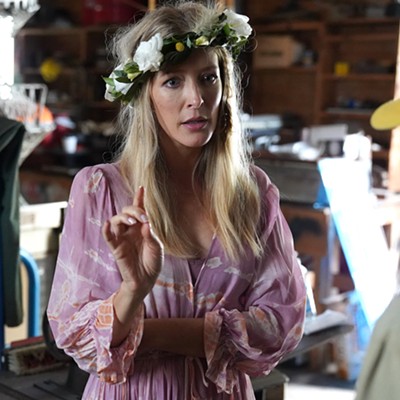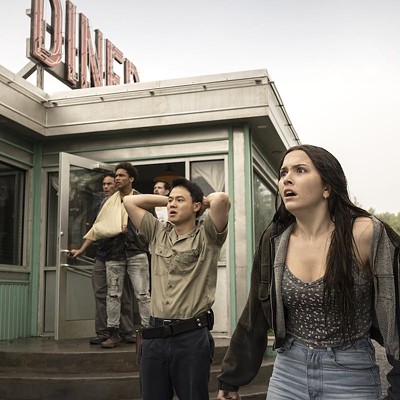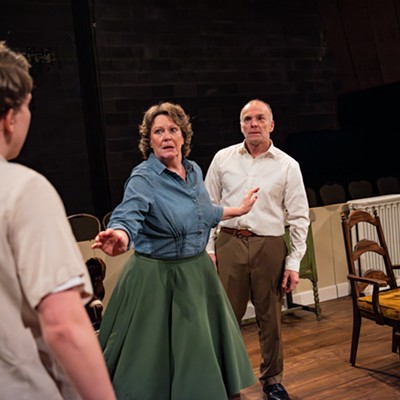“Happy September 11th,” said one theatre manager to another as I cruised through the press entrance yesterday morning.
Too soon, right? Still?
The city is noticeably less festival-crazed now—the newspapers have bumped pictures of stars from the front page in favour of federal election coverage and high-profile murders (a two-year-old! A dude shot then dumped on the 401 in the middle of the day!). The swarms of people in Yorkville have slowed to a trickle. Even the Sutton Place Hotel, the festival hub, has resumed presumably normal activities. There’s no line to use a computer in the press room. You can walk down any hall unimpeded.
The first morning’s presser, in the mammoth theatre 8 at the Varsity (capacity 580; the program tells you the capacity of all festival screening venues), is pretty sparsely attended. It’s for What Doesn’t Kill You which opens with the title card “The story you are about to see is true.” Great. Cue the armoured car heist with some unrecognizable people and Kevin Dillon. Oh wait, that’s...Ethan Hawke? Short short hair and manorexia are not a good look, my friend.
What Doesn’t Kill You is based on the life of director Brian Goodman, who spent his formative years in South Boston running errands for the local crime syndicate with his best friend Paul (Hawke). Goodman, who appears in the movie as the crime boss who mentored him, has the good fortune to be portrayed by Mark Ruffalo. Cut to 15 years later—which is the biggest problem I had with the thing; we start when the boys are maybe 15 but Ruffalo is 41 and Hawke about to turn 38 so when they have added grey to Ruffalo’s hair after a “Five Years Later” card it’s actually his actual age—and Brian and Paul have moved up in the world, but not high enough to their estimation, and so they start poking around for side jobs.
It’s your pretty standard working-class crime thriller—so standard that the opening shot of the Boston Harbour recalls Mystic River—made decent by Ruffalo, who can elevate almost anything (except for All the King’s Men). It doesn’t have the casual brutality of a mob movie, which I appreciated, instead trying to find the people behind the petty criminals.
After the door-smacking incident I took a reclining leather seat in the fancy Varsity VIP for the very emo-sounding Medicine for Melancholy, which some review compared to Do the Right Thing, which is waaaaayyyyy off. (The leads are black; this is not enough evidence.) It’s a two-hander shot in beautiful black-and-white set in Sa Fransisco, where we meet Micah (dreamy Wyatt Cenac) and Joanne (Tracy Heggins) who have just had a one-night stand followed by an awkward breakfast. When she leaves her wallet in the back of a cab, Micah tracks her down and they end up spending the day and night together getting to know one another. (If anything, it owes more to Andrew Bujalski and co. than Mr. Lee, which is a back-handed compliment.)
So it’s arty featuring no plot and an indie soundtrack? Finally, in the festival’s closing moments, I am home! While a scene where Jo and Micah walk by a community meeting about gentrification feels staged and obvious, writer-director Barry Jenkins otherwise slips in some politics about class and race that emerge organically and give the light story some bite. Medicine for Melancholy screened in TIFF’s Discovery program, and it was an apt placement. I’d be surprised if this film ascended the festival circuit, but keep an eye out at Video Difference, and for Jenkins’ name in the future.
My final film of the festival was the one I was looking forward to the most: Richard Linklater’s Me and Orson Welles. Linklater is the most underrated and most diverse contemporary director working today, the same guy who helped define a generation with Slacker (and, unfortunately, gave those mumblecore twits a blueprint), created one of the most iconic teen movies ever in Dazed and Confused, delivered two beautiful love stories a decade apart (Before Sunrise and Before Sunset), resurrected rotoscoping via Philip K Dick (A Scanner Darkly), gave Jack Black his best Jack Blackian role ever in School of Rock and was one of the first major directors to shoot on DV (Tape). I COULD GO ON.
Me and Orson Welles stars Zac Efron, of all people, as an aspiring actor in 1930s New York who trips into a production of Caesar directed by Orson Welles (Christian McKay), who’s as egomaniacal and thoughtless as you would expect. It’s a very inside-baseball kind of movie about the theatre, which means it will probably have an audience limited to English majors and New Yorker subscribers, but it’s beautifully shot, very funny and gives Efron his first chance to act (the kid really is a triple threat). Ben Chaplin as a self-serious Shakespearean actor and Claire Danes as an ambitious secretary are solid, and McKay all but steals the show with a Welles who’s grandiose and ridiculous but manages to step out of the way of his own brilliance once in awhile to acknowledge others. Points off for the cheesy final shot, but other than that, it was a terrific relief to end this shrugger of a festival on a high note.
Thanks to you for reading and to Les and Victor for the air mattress.













